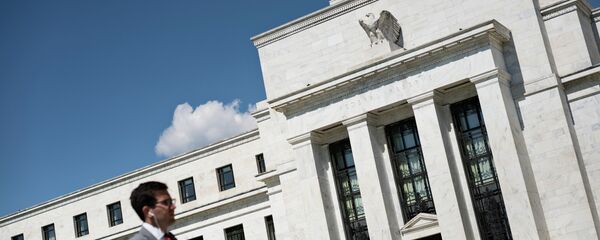Kristian Rouz — A new poll from the Wall Street Journal/NBC found that a rising number of Americans tend to view economic prospects with a greater share of scepticism than just one year ago. This, despite recent macroeconomic reports suggested GDP growth could actually accelerate into the first half of 2019 — but general public isn't convinced.
The poll, conducted in recent weeks, found scepticism of US economic prospects hit its highest since late 2013. at that point, the US stood just on the verge of the shale oil boom — which, some experts suggest, has allowed for the extension of America's business cycle of typically 10 years well beyond its regular timeframe.
READ MORE: EU Should Prevent US-China Trade Row From Escalating — German Economy Minister
This time around, respondents appear to have connected the prevailing pessimism in the news cycle, political woes surrounding the Trump administration, and the international trade tensions to their subjective perception of the health of US economy.
Only 28 percent of respondents, the poll found, believe the US economy will improve next year — compared to 35 percent saying the same in January 2018. Another 33 percent expect macroeconomic conditions to deteriorate — compared to only 20 percent back in January.
"For the first time in Trump's presidency, his safety net of a robust economy shows signs of unravelling", Fred Yang of Hart Research Associates said.
This could be a remarkable reversal in public perception of US President Donald Trump's economic policies. Back in January, economic optimism gained a boost from then-recently passed tax cuts, as well as rapid deregulation of the economy.
While the administration has contemplated another round of tax reductions throughout this outgoing year — which could go into effect sometime in 2019 — possible partisan tensions in Congress could mar an implementation of such a plan.
READ MORE: 'As US Economy Becomes Overheated, It Gets a Bit Less Attractive' — Economist
The poll's findings, however, poorly correlate with a flurry of recent reports from regional Federal Reserve banks. For example, according to the Atlanta Fed's GDPNow, the US economy is poised to grow 3.0 percent in 4Q18 — an upward revision from the previously-forecast of 2.4 percent.
According to reports from earlier this year, US GDP rose 2.2 percent in Q1, 4.2 percent in Q2, and 3.5 percent in Q3. A slowdown towards 2 percent would be typical for the cold-season Q4 — yet, this doesn't appear to be the case, potentially suggesting 1Q19 could be a fast-growth quarter as well, in defiance of the typically overwhelming downside factors that time of year.
The Atlanta Fed also found that the GDP growth rate for all of 2018 would stand at 3.23 percent — slightly above Trump's target of 3-percent growth for this outgoing year. The question, however, remains, whether this momentum will be sustained in 2019.
All in all, from a technical standpoint, the US economy appears to be in good shape — despite the widening gap of negative currently account balance, which is set to rise to 3.4 percent of GDP next year compared to 3.0 percent in 2018. Additionally, US household debt has surpassed $13.5 trln — which could also be problematic.
Now, the WSJ/NBC poll appears to reflect the individual perception of economic health by those same consumers, who are supposed to do well in the Trumpian economy. However, as evidenced by the debt figures, many Americans might finds themselves in a tough situation despite the abundance of jobs and rising hourly pay.
READ MORE: US-China Trade Dispute Could Have 'Unseen Effect on Global Economy' — Economist
The Fed's rising rates could also complicate financing and refi options for consumers, while sky-high property prices in many urban areas make homeownership harder. Additionally, recent migration trends — both domestic and international — have been steadily pushing rents up as well.
"Owning a home and having a high debt-to-income ratio makes a lot of sense if the alternative is renting and having all your income go towards rent," Ed Golding of the Urban Institute said. However, he added that "the American public is more leveraged than I would like."
However, a recession in 2019 in highly unlikely, experts say.
"Is it enough to put you in recession?" Jay Bryson of Wells Fargo Securities said. "No. But if the car was driving at 70 miles per hour, this gets you down to 55, and nobody likes to drive at 55 miles per hour anymore".
Some economists believe the US will be able to strike some sort of a trade agreement with China, while a new trade pact with Mexico and Canada — as well as many more accords of the like in the pipeline — would likely provide a renewed impulse to US GDP expansion.
However, the question remains, whether all this will make the broader American public more confident of their own economic prospects.




